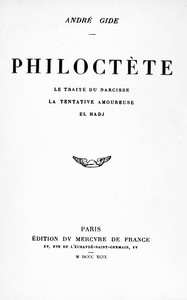Philoctète : Le traité du Narcisse. La tentation amoureuse. El Hadj by André Gide
"Philoctète : Le traité du Narcisse. La tentation amoureuse. El Hadj" by André Gide is a multi-part work that appears to be a blend of philosophical treatise and dramatic narrative, written in the late 19th century. The book primarily revolves around themes of morality and human desire, exploring complex emotional and ethical dilemmas through the lens of its characters, particularly focusing on Philoctète and his interactions with Ulysse and Néoptolème. The opening
of the work introduces us to a cold, desolate island where the characters Ulysse and Néoptolème are preparing to confront Philoctète, a warrior abandoned by his comrades due to a grievous wound. As they discuss their mission—to retrieve Philoctète's powerful bow for the sake of their homeland—the tension rises around themes of betrayal, duty, and the essence of virtue. Néoptolème grapples with the moral implications of their plan, expressing reluctance to deceive a man in distress, while Ulysse counters that the greater good of their homeland justifies the deception. The stage is thus set for a deeper exploration of ethical conduct and the complexity of human relationships as the characters navigate their desires and obligations. (This is an automatically generated summary.)
Read or download for free
| How to read | Url | Size | |||
|---|---|---|---|---|---|
| Read now! | https://www.gutenberg.org/ebooks/71227.html.images | 173 kB | |||
| EPUB3 (E-readers incl. Send-to-Kindle) | https://www.gutenberg.org/ebooks/71227.epub3.images | 184 kB | |||
| EPUB (older E-readers) | https://www.gutenberg.org/ebooks/71227.epub.images | 184 kB | |||
| EPUB (no images, older E-readers) | https://www.gutenberg.org/ebooks/71227.epub.noimages | 143 kB | |||
| Kindle | https://www.gutenberg.org/ebooks/71227.kf8.images | 308 kB | |||
| older Kindles | https://www.gutenberg.org/ebooks/71227.kindle.images | 290 kB | |||
| Plain Text UTF-8 | https://www.gutenberg.org/ebooks/71227.txt.utf-8 | 149 kB | |||
| Download HTML (zip) | https://www.gutenberg.org/cache/epub/71227/pg71227-h.zip | 140 kB | |||
| There may be more files related to this item. | |||||
Similar Books
About this eBook
| Author | Gide, André, 1869-1951 |
|---|---|
| Title | Philoctète : Le traité du Narcisse. La tentation amoureuse. El Hadj |
| Original Publication | France: Mercure de France, 1899. |
| Credits | Laurent Vogel and the Online Distributed Proofreading Team at https://www.pgdp.net (This file was produced from images generously made available by the Bibliothèque nationale de France (BnF/Gallica)) |
| Reading Level | Reading ease score: 81.6 (6th grade). Easy to read. |
| Language | French |
| LoC Class | PQ: Language and Literatures: Romance literatures: French, Italian, Spanish, Portuguese |
| Subject | French literature -- 19th century |
| Category | Text |
| EBook-No. | 71227 |
| Release Date | Jul 19, 2023 |
| Copyright Status | Public domain in the USA. |
| Downloads | 222 downloads in the last 30 days. |
| Project Gutenberg eBooks are always free! | |

